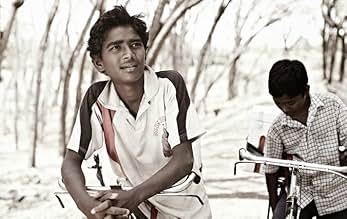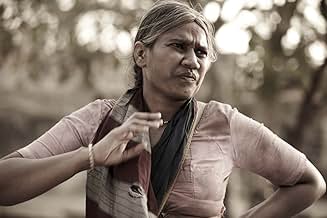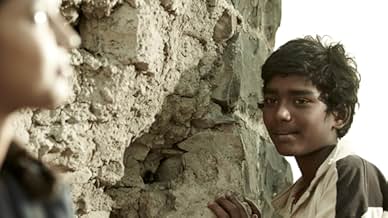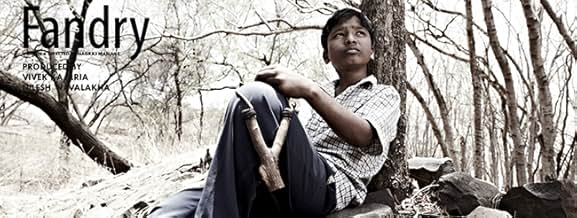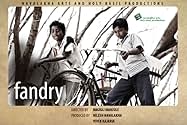IMDb RATING
8.2/10
2.7K
YOUR RATING
It is about a teenager from a Dalit (Oppressed caste) family, who lives at the village fringe, and falls in love with an upper caste girl.It is about a teenager from a Dalit (Oppressed caste) family, who lives at the village fringe, and falls in love with an upper caste girl.It is about a teenager from a Dalit (Oppressed caste) family, who lives at the village fringe, and falls in love with an upper caste girl.
- Awards
- 4 wins & 1 nomination total
- Director
- Writer
- All cast & crew
- Production, box office & more at IMDbPro
Featured reviews
Hollowness of Caste System Turned Into A Brilliant Screenplay That Reminds The Work Of Satyajit Ray,
This is truly an exemplary piece of art depicting the disparity in the Indian caste system which has plagued the Indian society for centuries & even today our society at large haven't been able to overcome.
This is a movie about the aspirations of a village teenage boy from a very poor family of lower caste "kaikade". The family consists of ayi, appa, mulga (son Jabya) & mulgi(daughter). The family earns their livelihood by taking care of the cleanliness of the village to catching of pigs roaming around the village, so it leaves no doubt on the audience of the movie to realize the family's standard of living. Inspite of the challenge of 'hand to mouth' existence, Jabya likes going to school & is in complete disapproval of his families profession, particularly catching of pigs so that the pigs do not mess up the cleanliness of the high class people living in the village.
The movie clearly depicts the Herculean task of a Father to get his daughter married particularly when the resources are scarce. The expressions of the father is very touching particularly when one tries to put himself in the shoes of a daughter's father, particularly because of the harsh circumstances of their struggle to merely survive. On the other hand, Jabya likes a girl from his class who is from higher class family & it is his strong desire to own a pair of new jeans & top just to look good & impress his love. This thought process itself proves the innocence of a pure soul which has fallen pray to the sweetness of love.
The movie ends with the self realization of Jabya that the society in which he is a part of, has no appreciation or value for his thought process & ultimately is left disgruntled, remorse, shattered & heart broken only to bring in the darker side of a shattered soul.
This writing wasn't an easy writing at all as compared to the other movies that I have watched & jotted down my feelings about it. It took me more than a days time to just to think & join in the dots of hollowness within our caste system. Last but not the least, every effort in making such great films that brings out the hollowness within society of so called noble & social living beings, deserves a great amount of respect & accolades in portraying the darkest side hidden somewhere within us. This movie , even though released in Marathi in 2013, in the so called era of "Hi-Fi Tech Savvy India", took me back to the era of 1960's the first ever Indian Academy Award winner Mr. Satyajit Ray who has made History in Indian Cinema for his epic titles "Pather Pachali, Aporajita & Apur Sansar" popularly known as "The Apu Trilogy". With existence of like minded filmmakers, it makes me believe beyond any doubt that the art of filmaking will stay alive for some more time for us to appreciate the hues of life.
This is a movie about the aspirations of a village teenage boy from a very poor family of lower caste "kaikade". The family consists of ayi, appa, mulga (son Jabya) & mulgi(daughter). The family earns their livelihood by taking care of the cleanliness of the village to catching of pigs roaming around the village, so it leaves no doubt on the audience of the movie to realize the family's standard of living. Inspite of the challenge of 'hand to mouth' existence, Jabya likes going to school & is in complete disapproval of his families profession, particularly catching of pigs so that the pigs do not mess up the cleanliness of the high class people living in the village.
The movie clearly depicts the Herculean task of a Father to get his daughter married particularly when the resources are scarce. The expressions of the father is very touching particularly when one tries to put himself in the shoes of a daughter's father, particularly because of the harsh circumstances of their struggle to merely survive. On the other hand, Jabya likes a girl from his class who is from higher class family & it is his strong desire to own a pair of new jeans & top just to look good & impress his love. This thought process itself proves the innocence of a pure soul which has fallen pray to the sweetness of love.
The movie ends with the self realization of Jabya that the society in which he is a part of, has no appreciation or value for his thought process & ultimately is left disgruntled, remorse, shattered & heart broken only to bring in the darker side of a shattered soul.
This writing wasn't an easy writing at all as compared to the other movies that I have watched & jotted down my feelings about it. It took me more than a days time to just to think & join in the dots of hollowness within our caste system. Last but not the least, every effort in making such great films that brings out the hollowness within society of so called noble & social living beings, deserves a great amount of respect & accolades in portraying the darkest side hidden somewhere within us. This movie , even though released in Marathi in 2013, in the so called era of "Hi-Fi Tech Savvy India", took me back to the era of 1960's the first ever Indian Academy Award winner Mr. Satyajit Ray who has made History in Indian Cinema for his epic titles "Pather Pachali, Aporajita & Apur Sansar" popularly known as "The Apu Trilogy". With existence of like minded filmmakers, it makes me believe beyond any doubt that the art of filmaking will stay alive for some more time for us to appreciate the hues of life.
Regional cinema in India (that excludes Bollywood and the big mainstream Tamil and Telugu movies) occasionally yields little gems like this flick. I heard of it on a news program towards the end of 2014 - the anchor was listing her favorites from the year gone by and she mentioned this as a must-watch inter-caste school love story. That is not quite accurate - the love is deep but one-sided, unrequited, and as one realizes early on, rather hopeless. A low- caste school boy is smitten by the pretty high caste girl that he sees in school every day but centuries of caste stigma are not easily shaken off by sharing the same classroom. The low caste family is routinely humiliated and called upon to trap the wild pigs that roam the village - the rest of the villagers consider the pigs unclean and any contact with the pigs impure. The boy rages against the caste trap and his own father for forcing him to take part in trapping pigs. The movie unfolds slowly for most of its running time, and the high caste characters are almost caricatures in their cruel callousness. Yet, the movie comes alive with a brutal brilliance in the last 10 minutes as shame and fury collide within the tormented boy in an explosive climax. The very last scene is like a punch in the stomach as the raging boy seems to hurl a stone at the audience itself for being mute spectators to injustice.
This movie is staged in a rural village in India. It focuses on the young son of the only family of "untouchables" in the village. He hopes and dreams for more than he is allowed to have, which contrasts to the humiliations he must endure being of such a low caste. He also struggles with coming of age, as he finds he has feelings of attraction to a girl.
The story has a slower pace, allowing us to really experience and contemplate the daily life of this boy and his poverty-stricken family. Their struggles and the oppression they face feel more meaningful because these things are not exaggerated in the name of drama, instead realism is the focus.
The story has a slower pace, allowing us to really experience and contemplate the daily life of this boy and his poverty-stricken family. Their struggles and the oppression they face feel more meaningful because these things are not exaggerated in the name of drama, instead realism is the focus.
When Fandry was released in 2013, it was critically acclaimed. I did not get chance to watch it then.
I saw Sairat, and later when Dhadak was released - I revisited Sairat and while reading about the Director Nagraj Manjule - came again across his first feature length film - Fandry.
The story is about 13 year old adolescents boy Jabya's dream - his unrequited LOVE towards Shalu, a girl studying with him. And Jabya's dis-interest in his untouchable lower caste's based role his father Kachru plays in the village doing menial jobs. The story eloquently leads us to the final set-up where embarrassed Jabya has to give a hand to his father to catch a piglet in front of his school mates inside a garbage ground.
It is an utterly heart-wrenching tale of realization of broken dreams of LOVE in front of whole village, especially in front of the girl who too laughs are the family's endeavors of catching a pig; where people humiliate and playfully laugh and make fun of Jabya.
After watching Fandry I also watched a short film of the director Nagraj - Pistulya (10 minutes short film)
Few things stand out as Director Nagraj Manjule's trademarks -
All the lead characters of the movie have enacted their roles beautifully. Applause to Somanth Awghade who plays Jabya and Kishore Kadam who plays Jabya's father Kachru.
The movie has won several awards including the National Award for best debut director and child artist.
The movie's cinematography is worth mentioning which has been captured with great still shots reminding us of internationally acclaimed directors like Terrence Mallick with sensibilities of Satyajit Ray's Pather Panchali. The use of symbolism in beautifully interwoven with the flow of the script.
Director Manjule too has also done a small cameo as a mentor of Jabya. I will recommend this movie whole-heartedly. It was a stepping stone for Manjule to come out with the commercial block-buster Sairat - without compromising on the theme and his movie making style.
Great watch - Go, find FANDRY from somewhere - it is on Netflix too and watch it. The movie will change the way you look at life.
(I will go with 7.75 out of 10)
I saw Sairat, and later when Dhadak was released - I revisited Sairat and while reading about the Director Nagraj Manjule - came again across his first feature length film - Fandry.
The story is about 13 year old adolescents boy Jabya's dream - his unrequited LOVE towards Shalu, a girl studying with him. And Jabya's dis-interest in his untouchable lower caste's based role his father Kachru plays in the village doing menial jobs. The story eloquently leads us to the final set-up where embarrassed Jabya has to give a hand to his father to catch a piglet in front of his school mates inside a garbage ground.
It is an utterly heart-wrenching tale of realization of broken dreams of LOVE in front of whole village, especially in front of the girl who too laughs are the family's endeavors of catching a pig; where people humiliate and playfully laugh and make fun of Jabya.
After watching Fandry I also watched a short film of the director Nagraj - Pistulya (10 minutes short film)
Few things stand out as Director Nagraj Manjule's trademarks -
- His movies portrays his personal experiences of life,
- There is an angle of LOVE,
- The movies are based in smaller towns and villages,
- the protagonists are mostly new and unknown faces who are drawn into acting,
- There is social issues highlighted in the movie - castes, discrimination, honor killing, education
- The movies are a good mix of lighter moments,
- The music of the movies is good,
- The movies are made with much sensitiveness,
- One can see the glimpses of great master at work,
- It looks evident that a lot of work has been done at the script (writing) stage,
- There are moments in the movie that are heart wrenching,
- The endings of all the three movies are tragic
All the lead characters of the movie have enacted their roles beautifully. Applause to Somanth Awghade who plays Jabya and Kishore Kadam who plays Jabya's father Kachru.
The movie has won several awards including the National Award for best debut director and child artist.
The movie's cinematography is worth mentioning which has been captured with great still shots reminding us of internationally acclaimed directors like Terrence Mallick with sensibilities of Satyajit Ray's Pather Panchali. The use of symbolism in beautifully interwoven with the flow of the script.
Director Manjule too has also done a small cameo as a mentor of Jabya. I will recommend this movie whole-heartedly. It was a stepping stone for Manjule to come out with the commercial block-buster Sairat - without compromising on the theme and his movie making style.
Great watch - Go, find FANDRY from somewhere - it is on Netflix too and watch it. The movie will change the way you look at life.
(I will go with 7.75 out of 10)
The movie is so simple would like to compare this with Iranian movies. If you love watching Iranian movies then fandry is must watch keeping in mind the simplicity of the acting yet successful in delivering the strong message of living in poverty & suffering from caste discrimination. The film is focused on a young boy who lives below poverty in a village and how he gets caught into superstition to get hold of his love who belongs from an upper caste society...Unlike other Indian movies where scenes are sometimes more emotionally biased, this movie will not make you cry but still will make you think against the three sensitized subjects of poverty, caste discrimination and superstition to some extent..
Did you know
- TriviaThe Director Nagraj Manjule had to convince Somnath Awaghade(Jabya) three months for this role. Somnath has grown up in rural area and has never appeared even in Screen related activity and he was taking director's words as a joke. But, ultimately he accepted the role.
- ConnectionsReferences Judaai (1997)
- SoundtracksFandry Theme Song
Composed by Alokananda Dasgupta
- How long is Fandry?Powered by Alexa
Details
- Runtime1 hour 41 minutes
- Color
- Aspect ratio
- 2.35 : 1
Contribute to this page
Suggest an edit or add missing content



